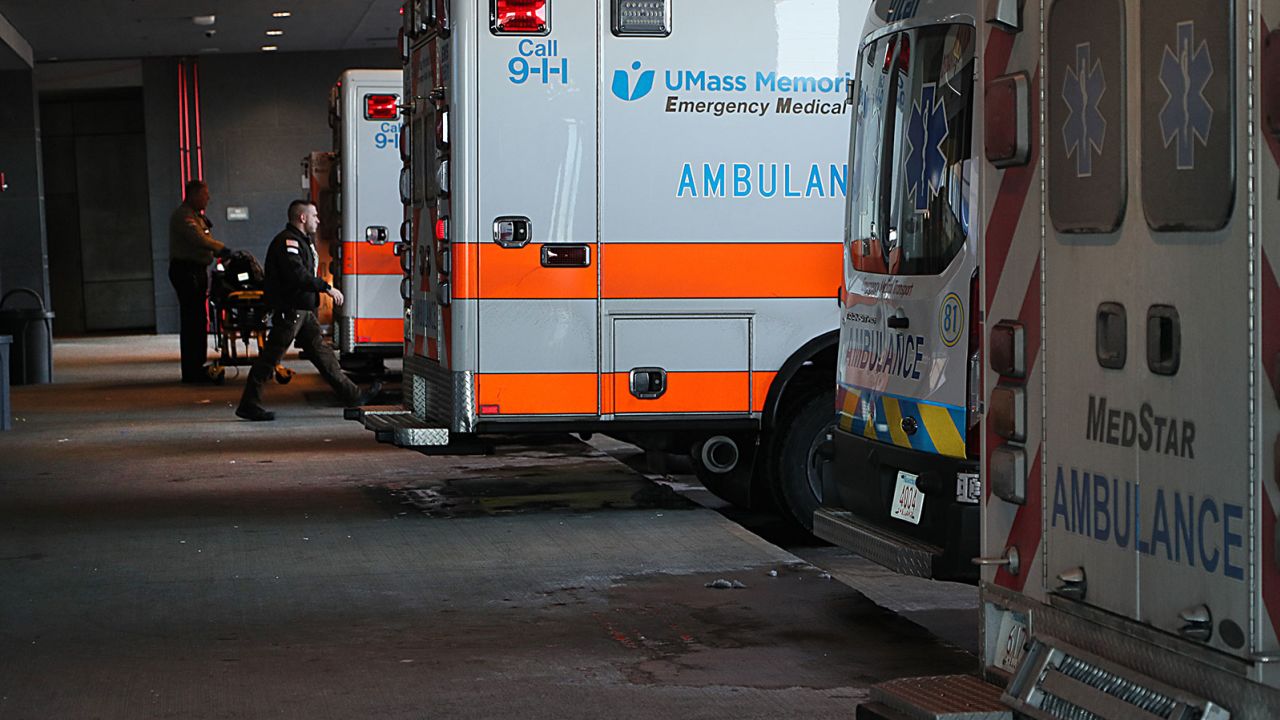How to stay safe from cold temperatures 1:39
(CNN) --
When Linda Stewart felt a tickle in her throat a few weeks ago, she worried.
She is a 76-year-old woman, and she is very aware of the risks posed to her health and that of her husband by covid-19, influenza and other diseases that are sweeping the United States in the midst of a harsh season of respiratory viruses.
"I don't want to take any risk with my health," he said.
Throughout the pandemic, a positive covid-19 result in an older person has carried additional weight.
According to data from the US Centers for Disease Control and Prevention (CDC), only 13% of all registered cases in the country have occurred in people over 65 years of age.
But about half of all hospitalizations and three-quarters of all deaths have been in this age group.
The hospitalization rate of the elderly with COVID-19 has generally risen and fallen in line with general trends, reaching an all-time high last winter during the omicron surge and declining significantly in summer.
But compared to other age groups, hospitalization rates have been consistently higher among the population 65 and older.
This winter, covid-19 trends across the country are on the rise.
So far, the increase appears to be relatively mild: Hospitalizations are rising in most states, though the overall rate is still just a fraction of what it was during other outbreaks.
advertising
But in the case of older adults, the situation is much more serious.
Hospitalizations of the elderly are nearing the peak of the delta variant surge and rising rapidly.
And the age difference has never been so big.
Since October, the covid-19 hospitalization rate among older people has been at least four times higher than average.
Even during the first winter wave of 2020, when covid-19 swept nursing homes, the difference was never more than triple.
Nearly 1 in 4 young adults in the US received mental health treatment during the pandemic, according to a CDC survey
Dr. Eric Topol, a physician and professor of molecular medicine at Scripps Research, has dubbed the ongoing surge the "senior wave."
"Right now we have a wall of immunity built against the omicron family -- between vaccines and previous infections and combinations thereof -- that seems to keep the very young in pretty good shape. But the immune systems of the elderly don't they're so strong," says Topol.
Younger immunosuppressed adults are also likely experiencing disproportionately severe effects from the latest wave, but there are insufficient data to clearly understand trends in that population.
Newer variants that more easily evade immunity and the relatively low use of treatments such as Paxlovid may have played a role in the increased hospitalization rate among older adults, according to Topol.
But "the main culprit is the deficiency of reinforcements," with rates that are "sadly inadequate," he said.
"Everything points to a decrease in immunity. If more elderly people were vaccinated, the effect would be minimal."
Protracted Covid-19 kills thousands in US, report reveals, but true toll likely much higher
Vaccines help, and boosters keep working
Stewart says she has scaled back on personal mitigation measures but remains vigilant about covid-19 trends.
She has found a balance between caution and prevention that she says works for her, but what really helps her feel safer is being vaccinated.
"I pay attention to the fact that it's increasing, so I'm a little more careful than six weeks ago," he says.
"With the augmentation, I'm not back to how I was a couple of years ago, but I'm more aware of who I'm with and maybe I wear the mask a little more than before."
Stewart took a home test for Covid-19 that came back negative and was confirmed with another test at a health care provider's counter, which was some relief, he says.
But even if the result was positive, knowing that she was vaccinated and boosted reassured him.
"That was the idea of being so proactive with all these vaccines. There was a very high chance that you would get sick, but not as much as someone who had not been vaccinated and there was a very high chance that you would not end up in the hospital," he says.
"In a way, that gave me the assurance that even if I did get it, it wouldn't be so bad."
But most seniors aren't as protected as Stewart.
When is the time to put on the third booster against covid-19?
According to CDC data, only a third of the population over the age of 65 has received the updated booster shot, a worrying figure for public health experts.
"It's very, very concerning," says Dr. Preeti Malani, a physician specializing in infectious diseases and geriatric medicine at the University of Michigan.
“There are a considerable number of people who have been vaccinated before and have not now, and I am concerned that there is confusion and misinformation.
So to the elderly -- and to everyone -- I say: if you haven't been vaccinated, do it."
A recent survey by the Kaiser Family Foundation found that 60% of seniors were concerned about an increase in Covid-19 cases and hospitalizations this winter, a much higher proportion than average.
More than 40% were concerned about getting seriously ill, but almost the same proportion said they were not planning to get vaccinated any time soon.
In fact, almost a quarter of the elderly state that they do not plan to get vaccinated or that they will only do so if required.
A community approach to protect the most vulnerable
Vaccines, including the updated booster, continue to prove effective in preventing serious illness.
But uptake of the booster shot among older people, while low, is much higher than in other age groups.
According to CDC data, less than 10% of adults under the age of 50 and less than 5% of children have received the updated booster dose.
Still, experts say the difference in vaccination rates isn't enough to explain the large and growing difference in hospitalization rates.
"The truth is, really, anyone can get it," Malani said.
"But the older you are, the more likely you are to have severe symptoms, the more likely you are to be hospitalized, and the more likely you are to die."
Paramedics transport and care for patients at the busy ambulance dock at UMass Memorial Medical Center.
The hospital has been operating above its normal capacity due to the large number of patients.
Credit: Boston Globe/Boston Globe/Boston Globe via Getty Images
According to experts, infectious diseases like covid-19 do not spread differently among older people than among young people.
On the contrary, it is family, friends and the community in general who usually spread covid-19 to older people, who are more likely to suffer more serious consequences.
"Older people are the most at risk, but we take it with them," says Malani.
"One thing unique to older adults is that many of them are grandparents and many of them take care of their grandchildren. So sometimes they get it from their grandchildren, who may also go to school or daycare."
Many seniors live in shelters, such as nursing homes, which also present unique risks.
But the issue remains that the elderly, although more vulnerable to severe outcomes, are not the main drivers of spread among the population.
OPINION |
Don't Send Grandma to Intensive Care This Christmas
A government surveillance report released earlier this month revealed that nursing home outbreaks were "strongly associated with community spread."
And nursing homes are once again especially vulnerable this winter.
Weekly cases among residents have already surpassed all previous surges except the initial winter surge and the omicron surge, and continue to rise.
But only 47% of residents and 22% of staff are "up to date" on vaccinations, according to data from the US Centers for Medicare & Medicaid Services.
"We would all have hoped to have a vaccine that would prevent transmission. We don't have a vaccine that will, but it reduces transmission and reduces serious outcomes," said Janet Hamilton, executive director of the Council of State and Territorial Epidemiologists.
For this reason alone, seniors who interact with other seniors should be vaccinated to help minimize serious outcomes, he said.
"But really, anyone who comes into contact with high-risk groups should be the main target for vaccination," he added.
The way forward is not all or nothing
Stewart plans to welcome her family back for Christmas this year, for the first time since the pandemic began.
"We are careful who we associate with. We don't feel any undue risk in meeting with the family. That is our security group," he says.
She and her husband also get together with small groups of friends who they trust are also vaccinated and are just as cautious, but they still plan to stay away from baseball games, even though it's one of their favorite pastimes.
"We love going to baseball games. We're true fans and very supportive of our team, but there's a lot of risk. We take the ferry and you're very close to a lot of people on that ride. And going to the stadium, again, we're very close from a lot of unknown people," he said.
"It's still too risky."
The true story of the origin of Christmas
Malani, the infectious disease specialist, said she recently spoke with a friend who seemed to be asking permission to join her family this holiday season.
She was eager to celebrate in person with her loved ones after years without doing so, but she was eager to let her guard down amid a tough season of respiratory viruses.
"It's about finding a balance, because viruses are dangerous, but so is isolation," he said.
"There is always a way forward, and for now, it is through vaccination."
Covid-19Elderly









